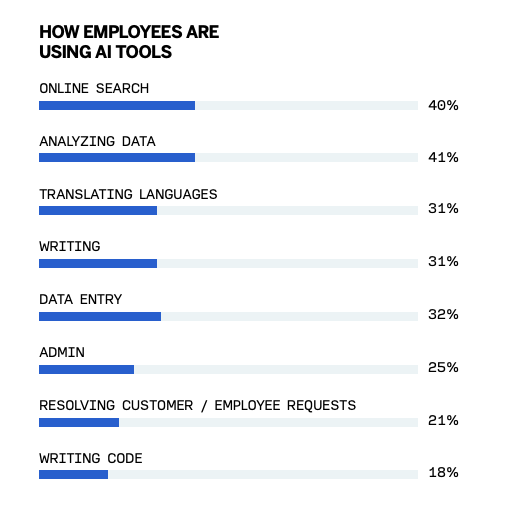
Many employers haven't adopted policies, training for AI: report

Employees are outpacing organisations when it comes to the adoption of artificial intelligence, which an expert has warned could raise "significant risks to employees, customers, and organisations."
The sixth annual Employee Experience Trends Report from Qualtrics found that 45% of employees are already using AI tools at work, either daily or weekly.
In fact, employees are mostly using AI tools for online searching, analysing data, and entering data, according to the report.

Source: Employee Experience Trends Report from Qualtrics
The widespread use of AI comes as 49% of employees feel optimistic about AI changing their work, rising significantly to 72% for employees who use AI tools daily or weekly.
But while the use of AI tools is strong among the workforce, the Qualtrics report also found that only half of employers have implemented related policies and training on AI.
According to the report, only 52% of employees said their organisation has clear principles, ethics, or guidelines on the use of AI tools.
A similar percentage also said their organisation is providing training and enablement on the use of AI tools.
The report further found that while 48% of employees use AI tools provided by their organisations, another 30% admit that they have been sourcing them themselves.
Benjamin Granger, Chief Workplace Psychologist at Qualtrics, said the report shows the "growing desire and readiness" among workers to leverage AI even without the support of their organisations.
"This introduces significant risks to employees, customers, and organisations alike," Granger warned. "Many workers are already looking for opportunities to use AI to augment their work and it is far better for organisational leaders to lean in and provide approved tools and clear guidance to gain the benefits of these technologies without putting the company or customers at risk."
To leverage the potential of AI, Qualtrics' report urged organisations to re-evaluate their technology transformation and adopt "holistic, people-centric strategies."
These strategies should be focused on enablement and utilisation, governance and training, and systems and processes that empower employees, according to the report.
"As those closest to the workforce, HR leaders and people teams play a crucial role in changing perceptions, encouraging adoption, and supporting the workforce as AI changes the nature of work," the report added.